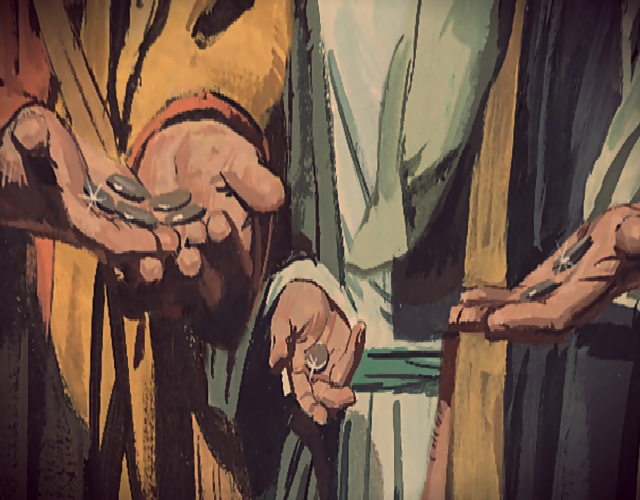Jesus told his disciples this parable: “A man going on a journey called in his servants and entrusted his possessions to them. To one he gave five talents; to another, two; to a third, one – to each according to his ability. Then he went away. Immediately the one who received five talents went and traded with them, and made another five. Likewise, the one who received two made another two. But the man who received one went off and dug a hole in the ground and buried his master's money. After a long time the master of those servants came back and settled accounts with them. The one who had received five talents came forward bringing the additional five. He said, ‘Master, you gave me five talents. See, I have made five more.' His master said to him, ‘Well done, my good and faithful servant. Since you were faithful in small matters, I will give you great responsibilities. Come, share your master's joy.' Then the one who had received two talents also came forward and said, ‘Master, you gave me two talents. See, I have made two more.' His master said to him, ‘Well done, my good and faithful servant. Since you were faithful in small matters,I will give you great responsibilities. Come, share your master's joy.' Then the one who had received the one talent came forward and said, ‘Master, I knew you were a demanding person, harvesting where you did not plant and gathering where you did not scatter; so out of fear I went off and buried your talent in the ground. Here it is back.' His master said to him in reply, ‘You wicked, lazy servant! So you knew that I harvest where I did not plant and gather where I did not scatter? Should you not then have put my money in the bank so that I could have got it back with interest on my return? Now then! Take the talent from him and give it to the one with ten. For to everyone who has, more will be given and he will grow rich; but from the one who has not, even what he has will be taken away. And throw this useless servant into the darkness outside, where there will be wailing and grinding of teeth.$0"2$
Matthew 25:14-30
The man traveling into a far country is our Redeemer, who ascended into heaven in that flesh which He had taken upon Him. For the proper home of the flesh is the earth, and it travels into a foreign country, when it is placed by the Redeemer in heaven. Calling together the Apostles, He gave them the Gospel doctrine, to one more, to another less, not as of His own bounty or scanting, but as meeting the capacity of the receivers, as St. Paul says, that he fed with milk those that were unable to take solid food (1 Cor. 3:2). In the five, two, and one talent, we recognize the diversity of gifts which we have been entrusted. The five talents denote the gift of the five senses, that is, the knowledge of earthly things; the two signify understanding and action, the one talent understanding only.
He that had received five talents, that is, having received his bodily senses, he doubled his knowledge of heavenly things, from the creature understanding the Creator, from earthly unearthly, from temporal the eternal. Again, there are some who by their understanding and their actions preach to others, and doubling their profit in such merchandise. This preaching bestowed upon both sexes is thus a talent doubled. To hide one's talent in the earth is to devote the ability we have received to worldly business.
The servant who had five talents made ten, and he who had two made four, are received with equal favor by the Master of the household, who looks not to the size of their profit, but to the disposition of their will. The servant who would not trade with his talent returns to his Lord with words of excuse. But what he thought would be his excuse is turned into his condemnation. Jesus calls him wicked servant, because he caviled against his Lord; and slothful, because he would not double his talent; condemning his pride in the one, and his idleness in the other.
So then we see as well the peril of the teachers if they withhold the Lord's money, as that of the hearers from whom is exacted with interest that they have heard, namely, that from what they have heard they should strive to understand that they have not heard. Observe that not only he who robs others, or who works evil, is punished with hell, but also he who does not do good works.
References:
Homiliae in Evangelia #19 (St. Gregory the Great)
Homily 78 on Matthew (St. John Chrysostom)
Commentariorum In Evangelium Matthaei (St. Jerome)
